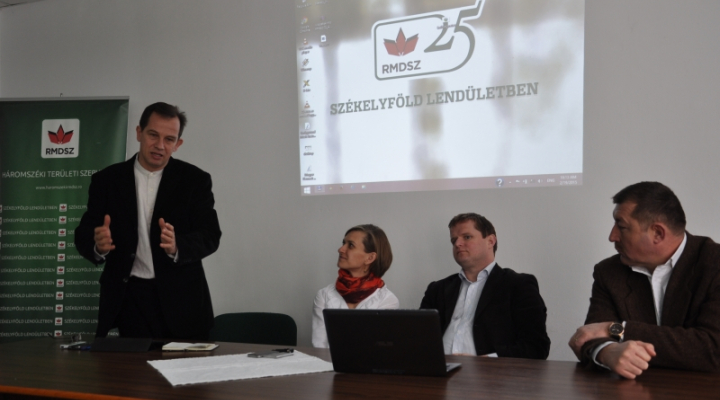Csaba Sógor: Romania must prepare for the new EU cohesion policy framework
Calls for project proposals out of the Agriculture and Rural Development Fund, soon to be available for local administrations, were presented to the mayors of Covasna County. The event entitled Rural development with European Union funds, which took place on the 19th of February was organised at the initiative of MEP Csaba Sógor in partnership with the RegioConsult Management and Investment Advisory Company and the territorial organisation of the RMDSZ.
The event was opened by József Nagy, vice president of Covasna County Council and MEP Csaba Sógor. The RMDSZ MEP stated: “The aim of the meeting is to offer information on financing opportunities that will become available for local administrations in the 2014-2020 financing framework. The calls for proposals from the next financial framework are still under development, but we can already outline the main rules. I think it is very important to prepare in advance for them, so that Transylvanian villages can have more financing for rural development and community projects in the new period” - explained the MEP.
Romania can spend the funds allocated for the 2007-2013 framework until the end of 2015. Consultants Gabriella Banu and Szabolcs Ilyés assessed that the county was able to use up 50-60% of these funds so far. “Should we manage to reach 70% by the end of the year, we will still give 9 billion back to the EU. Hungary and Poland proved that using up 90% of the funds allocated in possible. We ought to try to meet this target in the next framework” – explained Szabolcs Ilyés, adding that Romania will be allocated close to 42 billion Euros in the next period, 10 billion more than in the previous framework.
The consultants presented the details of the Agriculture and Rural Development Fund’s soon to be open measures regarding infrastructural investments and cultural heritage protection, which the local governments should try to benefit from.
The Romanian system for accessing national funds will undergo some structural changes in the upcoming period. In the opinion of specialist Szabolcs Ilyés most of these changes are welcome, such as the fact that three institutions will be handling these tender projects instead of the eight or ten handling them until now, which will somewhat simplify the bureaucratic processes. The mayors also stressed the importance of making the system more transparent, and thus increasing the willingness to apply. Csaba Sógor committed to give voice to the concerns expressed by the mayors in the forum of the European Parliament in Brussels.











